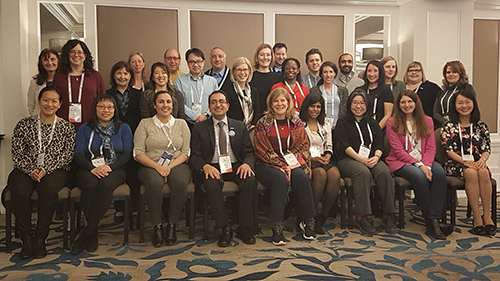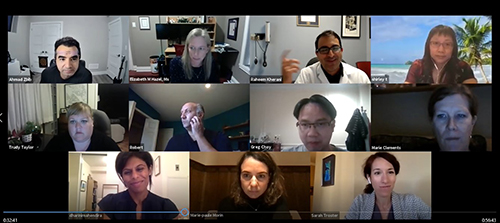Winter 2020 (Volume 30, Number 4)
Education Committee Report
By Elizabeth M. Hazel, MD, FRCPC; and Raheem B. Kherani, BSc (Pharm), MD, FRCPC, MHPE
“Zooming” towards on-line learning for all!
Download PDF
The CRA Education Committee is embracing the
challenges of delivering high quality education to
our membership during a pandemic. In 2017, the
committee was restructured, and the subcommittees have
continued to improve productivity. The CRA conducted an
educational audit this year and identified goals for continuous
improvement of our educational offerings. The audit’s
recommendations will help to guide the subcommittees in
their future projects, along with expanded leadership of the
committee.
Undergraduate Subcommittee
This committee has taken on an ambitious project to define
important components of the undergraduate medical
school curriculum, as they pertain to rheumatology. In developing
the National Undergraduate Rheumatology Curriculum
(NURC), they have consulted stakeholders from
across the country. They are in the midst of conducting
Delphi exercises to analyze their data, and their plan is to
have a report available for dissemination in 2021.
Postgraduate Subcommittee
With ongoing changes in residency training, including
Competence by Design (CBD), the postgraduate subcommittee
is developing shared educational resources to
supplement university residency programs’ current academic
curricula. Peer-reviewed resources will be uploaded
onto the CRA website and made available to the target
audiences. The first set of resources includes immunology
videos, musculoskeletal radiology videos and physical exam
resources. They have found a way to appropriately acknowledge
the authors. Their longer-term project is to create a
national immunology curriculum.
The National Written In-Training Exam (NWRITE) subcommittee
has revised their timeline to reflect the advancement
of the Royal College Exam to the end of trainees’ R5
year. This practice exam provides trainees
and program directors with valuable information
on how to best prepare for their final
exams.
CanREAL Subcommittee
Our experts in medical education scholarship
continue to share their expertise with
CRA members of our rheumatology community
through collaboration with ongoing
projects. CRA members are encouraged
to reach out to this advisory subcommittee
when there is expertise or consultation required
on medical education matters.
Continuing Professional Development
Subcommittee
While the CRA used to concentrate educational offerings
at our in-person Annual Scientific Meeting, the Continuing Professional Development (CPD) Committee is exploring
alternative educational offerings. They continue to provide
accreditation of Section 1 and 3 activities, as well as
assist CRA members and committees in the development of
CRA-accredited activities. The over-arching goal is to review
input from the membership to respond to their needs.
For example, at the start of the global COVID-19 pandemic,
they helped to coordinate a Webinar series to address the
needs of the membership. They are addressing the changing
landscape to move to assist the virtual delivery of content
through podcasts, webinars, and educational offerings
throughout the year. The committee also plans to scan the
patient perspective to ensure patient/stakeholder involvement
in CPD development and continue to work with other
CRA committees. We look forward to post-pandemic education
that will build on virtual and in-person collaboration.

BEFORE COVID-19 PANDEMIC

DURING COVID-19 PANDEMIC
Elizabeth M. Hazel, MD, FRCPC
Vice-Chair, CRA Education Committee
Clinical Associate Professor,
Program Director, Adult Rheumatology,
McGill University, Montreal, Quebec
Raheem B. Kherani, BSc (Pharm), MD, FRCPC, MHPE
Chair, CRA Education Committee
Clinical Associate Professor,
Program Director, Adult Rheumatology
University of British Columbia, Vancouver, British Columbia
|
